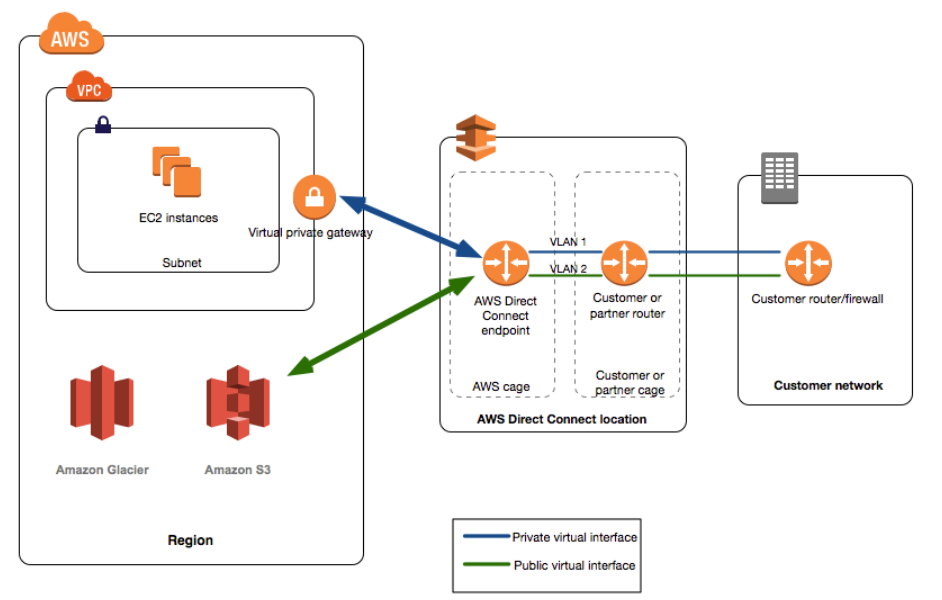What is Amazon Direct Connect And Why You Should Care
AWS Direct Connect is the onramp and offramp from AWS instances to other clouds. It provides you with various options to connect your dedicated AWS infrastructure to other PaaS, SaaS, and IaaS workgroups. Connecting to Direct Connect is simple, easy, and painless plus it can be turned on in minutes. You must fully understand the benefits and costs of your Amazon Direct Connect including Egress charges which many Dev teams are unaware of. In our prior post on Cloud Connectivity for 2022 we discussed everything from connecting using public Internet to Direct Hosted connections.
Virtual Cloud Routing
Connecting to AWS Direct Connect can be a great option for diversity and High Availability (HA) designs between instances. For example, if you have AWS East and West deployed, using Direct Connect with a Virtual Cloud Router provides an excellent option to deploy Failover options or routing data between the two environments. Designing with a Virtual Cloud Router, you can deploy BGP over a Software-Defined backbone connection in minutes and equally connect to your WAN. This eliminates the need to contract long-term with a telco carrier and consume bandwidth on demand elastically. Many enterprises look to extend their network such as SDWAN adding a node for their AWS instance which can be accomplished.
Interested in a Virtual Cloud Routing Design? Schedule time for a Demo with an Architect.
How much is AWS Direct Cost?
There are two cost elements you must be aware of, AWS Direct Connect Cost and whatever Transport (Hosted, SD, X-Connect, Internet VPN etc).
What is the Best Option to connect with AWS Direct Connect?
The best option is the one for your business! Each use-case is unique, however here are the common options to Connect to AWS Direct Connect
- Public Internet:
- Software Defined Virtual Private Circuit
- Colocation Providers
- Fiber Cross-Connect:
- Telco Carriers Cloud Connectivity
This eliminates the need to contract long-term with a telco carrier and consume bandwidth on demand elastically..
Each connectivity option leverages either VPN or AWS Direct Connect and, while both are viable options, you might find that one or both are better for your business requirements.
AWS-managed VPN
AWS-managed VPN is a hardware IPsec VPN that enables you to create an encrypted connection over the public Internet between your Amazon VPC and your private IT infrastructure. The VPN connection lets you extend your existing security and management policies to your VPC as if they were running within your own infrastructure.
VPN is a great connectivity option for businesses that are just getting started with AWS. It is quick and easy to setup. Keep in mind, however, that VPN connectivity utilizes the public Internet, which can have unpredictable performance and despite being encrypted, can present security concerns.
We have compiled a list of the Top Tier-1 ISPs globally which is a good start to evaluate if they would be a good network fit for your VPN.
AWS Direct Connect
AWS Direct Connect bypasses the public Internet and establishes a secure, dedicated connection from your infrastructure into AWS. This dedicated connection occurs over a standard 1 GB or 10 GB Ethernet fiber-optic cable with one end of the cable connected to your router and the other to an AWS Direct Connect router. AWS has established these Direct Connect routers in large colocation facilities across the world, providing access to all AWS regions. With established connectivity via AWS Direct Connect, you can access your Amazon VPC and all AWS services.
AWS Direct Connect is a great option for businesses that are seeking secure, ultra-low latency connectivity into AWS. While provisioning AWS Direct Connect can sometimes be more involved, it is worth it once the connectivity is established because of the ease of predictable network performance and 60% cost savings.
Comparison of AWS AWS-Managed VPN and AWS Direct Connect (Click here for the most recent)
AWS-Managed VPN
AWS Direct Connect
Performance
<4 GB per VPC
<1 GB, 1 GB, or 10 GB ports Up to 40 GB with Link Aggregation Group (LAG)
Connectivity
1VPN Connection to VPC
2 port connection to multiple VPCs
Resiliency
1 VPN Connection = 2 VPN tunnels
1 AWS router = redundant connectivity to 1 AWS region
Costs
$0.05 per VPN Connection Hour $0.09 per GB data transfer out
$0.2 to $0.3 per GB data transfer out Port hour fees(varies based on port speed)
In the end, the above write-up does play well within the AWS Well-Architected Framework dev teams can maintain around cost optimization. If you need a quick and free design suggestion on how best to use Direct Connect in your cloud network, contact us. One of our AWS experts would be happy to route you to the correct path!
Recent Posts
- How Laser Satellite Communication Breakthroughs Compete with Starlink
- AI-Powered Humanoid Robots: Transforming Business, Homes & Connectivity
- Top IT & Network Design Consultants in Boston and New England: Macronet Services
- Top AI Consultants in New England: Why New Hampshire’s Macronet Services Shines in Boston and Beyond
- IXPs in the US and Internet Peering
Archives
- July 2025
- June 2025
- May 2025
- April 2025
- March 2025
- February 2025
- January 2025
- December 2024
- November 2024
- October 2024
- September 2024
- August 2024
- July 2024
- June 2024
- May 2024
- April 2024
- March 2024
- February 2024
- January 2024
- December 2023
- November 2023
- October 2023
- September 2023
- August 2023
- July 2023
- June 2023
- May 2023
- April 2023
- March 2023
- February 2023
- January 2023
- December 2022
- November 2022
- October 2022
- September 2022
- August 2022
- July 2022
- June 2022
- May 2022
- April 2022
- March 2022
- February 2022
- January 2022
- December 2021
- November 2021
- October 2021
- September 2021
- August 2021
- July 2021
- June 2021
- May 2021
- April 2021
- March 2021
- December 2020
- September 2020
- August 2020
- July 2020
- June 2020
Categories
- All (19)
- Satellite (1)
- Artificial Intelligence (3)
- Travel (1)
- Sports (1)
- Music (1)
- News (271)
- Design (3)
- Clients (12)
- Uncategorized (1)
- Tips & tricks (25)
- Inspiration (9)
- Client story (1)
- Unified Communications (196)
- Wide Area Network (308)
- Cloud SaaS (60)
- Security Services (71)




